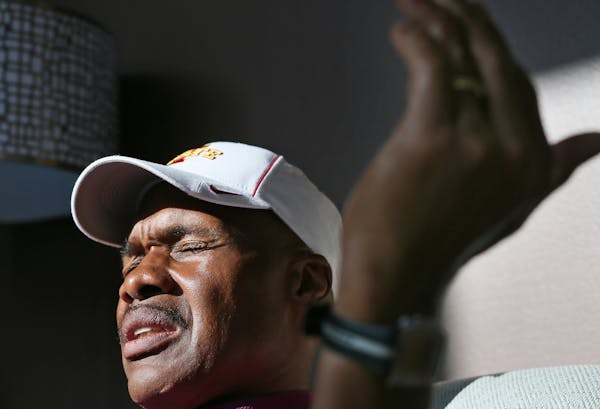Linebacker Fred McNeill, who played all 12 of his NFL seasons with the Minnesota Vikings in the 1970s and 1980s, has died, according to former teammate and close friend Matt Blair.
McNeill, who had been living in a Southern California nursing home and battling dementia, was 63. He died Monday night of complications of amyotrophic lateral sclerosis (ALS), according to Blair.
Blair, who lives in the Twin Cities, said Wednesday that he and McNeill "were more brothers than friends." The two were chosen in the same NFL draft, were lifetime Vikings and retired after the same season.
"Our rookie year was our best year," Blair said. "After that first year, we stayed in the same apartment. … I went to LA to meet his family, and we became great friends and hung out together."
Blair said he last saw McNeill in August during a visit to Los Angeles.
"He was doing OK," he said. "… But after I left, he was put in this 24/7 hospital for ALS [also known as Lou Gehrig's disease]. That's the thing that really got into his system."
McNeill's death has left Blair grateful for his own ability to think clearly but wondering why his 1,400-plus tackles spared him what McNeill endured.
"I just can't believe that I'm not going through what Fred went through," Blair said. "I'm just thankful."
McNeill played in two of the Vikings' four Super Bowl losses, 1975 and 1977. In the January 1977 title battle against the Oakland Raiders, McNeill blocked a punt by Ray Guy, the first time that had ever happened to the man considered the game's greatest at his position.
McNeill was the Vikings' first-round draft pick out of UCLA in 1974. Strong, fast and durable, McNeill retired in 1985 with more than 1,000 career tackles, placing him among the franchise's leaders in that category.
Vikings star defensive lineman Jim Marshall, who was a teammate during the first half of McNeill's career, said he knew McNeill was facing health problems, but still the news "caught me by surprise."
Marshall described McNeill as a "great person and just a fantastic linebacker. ... He always did his job."
McNeill and Marshall were among hundreds of former NFLers who filed one of the first lawsuits against the league over the affects of concussions suffered while playing.
"A lot of us have had some problems," the 77-year-old Marshall said Wednesday. "Fred was just 63 years old. You just don't expect him to go that soon."
A graduate of William Mitchell College of Law in St. Paul -- McNeill began his legal studies during his last NFL season -- McNeill became a lawyer after his playing days but his cognitive problems cost him his job with a Twin Cities law firm in 1996.
"As his disease took hold, it became more and more difficult for him to function as a lawyer," Barry Reed, one of McNeill's law partners said. "Of course nobody knew at that time that there was any kind of brain issue that was causing his difficulties . He was a funny, intelligent and charming man."
Reed, who graduated from UCLA at the same time as McNeill, said their relationship helped him "to see football from the players' point of view. ... The violence and brutality go far beyond anything you can see or sense from the stands. I was on the sidelines with him just once and was stunned by the true nature of the game. He paid the price for the ratings and the ad revenue that feed the beast.
"I will never see football the same way . It ended the life of a very good man."
McNeill's mental difficulties started surfacing about 15 years after leaving the NFL. His dementia was formally diagnosed in 2009.
"I'm happy to be alive," McNeill said in an interview in 2011 with the Vikings Update website. "I have been fortunate in a lot of different ways. I was in a position where I was making pretty good money. I was an attorney for over 20 years.
"Right now, I'm in the position of shutting down my office. Essentially I'm trying to get more assistance because of the impact of playing football."
He acknowledged in the interview that he didn't have to play football, "but if I knew then not to use my helmet as a tool to tackle people I think I could have been in a position to avoid the impact that I'm experiencing now."
McNeill and his wife, Tia, separated after they moved to Southern California, but she remained involved in his life and helped him research the affects of football on his mental health.
"There would be some bouts of anger, some just over the simplest of things," she said in an interview with WCCO-TV, Channel 4, in 2012. "I would be like, 'where is this coming from? This is not Fred.' "
Star Tribune staff writer Vince Tuss contributed to this report. Paul Walsh • 612-673-4482
Newspaper boxes repurposed as 'Save a Life' naloxone dispensaries

St. Cloud house vies for Ugliest House in America

Hennepin County paid $240K to settle former Sheriff Hutchinson's workers' comp claim
Female inductee in Minnesota Aviation Hall of Fame is flying high

